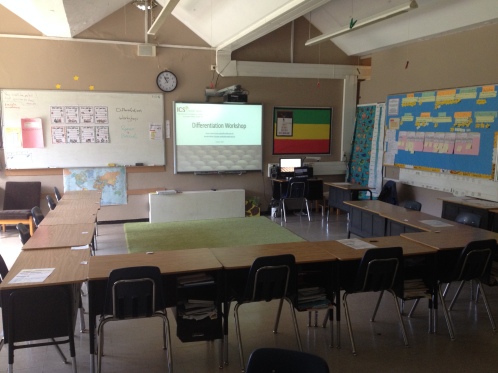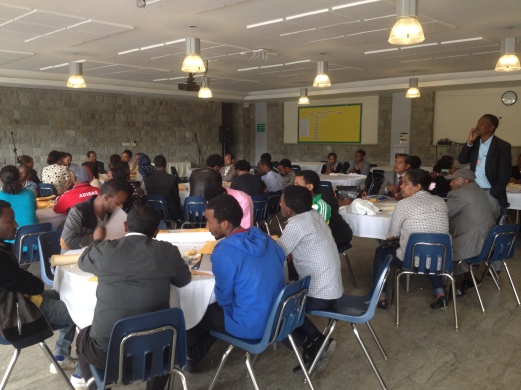I am very fortunate that my international school has such a strong and positive relationship with our local community. Last weekend I had the fortune to participate in professional development workshops, teachers at my school were giving to teachers of our local partner school, Mekdela.
The differences between the schools are obvious (and unfortunate). One is a wealthy international school serving sons and daughters of expatriate business people, diplomats, and the likes, while the other is a public Ethiopian “government” school serving over 1600 students on two rotations due to lack of space (a morning and an afternoon shift). From teacher salaries to classroom resources, the similarities are few and far in between. This being said, as expatriates living and working in the developing world, it is (what I see as) our moral obligation to share our knowledge and skills with our local teacher counterparts in whatever ways we can think of, and so these teacher workshops were a wonderful addition to my weekend.
The professional development day included over 80 teacher participants from the Mekdela school. There were about 15 workshops offered by my school’s teachers and teaching assistants. Each workshop was designed to last two hours. Expatriates who did not speak Amharic were provided with one of our school’s TAs, who served as a mediator and translator to the participants. We were to have two such workshops throughout the day.
I chose to share my knowledge of differentiation theory and practice. Immediately after volunteering to share my knowledge at the event, I was struck with the simple and obvious question- How do you differentiate instruction when you are a traveling (“a-la-carte”) teacher who have little to no resources and 40-60 students in a classroom??? I started by taking a deep breath!
After a short visit to classrooms at the local school, several hours of presentation planning, and middle of the night consultation with colleagues, I realized whatever shape the presentation would take, it would have to be interactive (to keep the audience engaged, to build on their knowledge, skills, interests, and needs), and to include both theory AND practice sections (background is important, and so does the application aspect!) And so by the morning, my presentation was born and the classroom prepared with visual aids and concrete resources for the teachers to browse through.

Although I was concerned with the time element, I felt that all the background information and theory, as well as the interactive nature of the presentation, were necessary. And I must say that the workshops went quite well, aside for the fact that I did not take into consideration the delay in participants’ arrival and the time it would take to translate everything I was saying… What I assumed would be two full hours, were actually about 70 minutes of material…
Unfortunately, in the first presentation teachers had little time to work on concrete and authentic strategies for their own classes, which was quite disappointing to me. So I was happy that I had the time to create a packet of handouts for each participant, which included both theory and practical advice for a variety of subjects. Those, I was hoping, would allow them to reflect and experiment in their own time. Not ideal… I had to re-think the second session!
The second workshop went better. I briefly introduced slides, and let Ato Bereket, my fantastic and overly-qualified translator, to take it from there and explain concepts and ideas directly in Amharic. This allowed us to go through the material faster without compromising the discussion and content. We had more time to work on individual strategies, although another hour or two of collaborative work would have been wonderful!
All in all, this was a very successful educational day for everyone involved. After the presentations ended we got together, shared a buna (coffee) ceremony, exchanged thank yous, took a photo together, and started our weekend…

Upon reflection, I must say I am very impressed with the motivation these local teachers have to improve and enrich their understanding and practice as teachers. These workshops were not mandatory, they did not get paid for attending them, and many would think that they would not be very applicable to their situation. Yet they attended, participated, stayed to ask questions, and asked if they could come in the future and observe the classroom or create some sort of a collaborative practice with us teachers.
What an inspirational day. I hope I will continue to be involved in this collaboration and be able to see how these teachers grow in their profession, and how I grow as a result of these experiences.
The professional development day included over 80 teacher participants from the Mekdela school. There were about 15 workshops offered by my school’s teachers and teaching assistants. Each workshop was designed to last two hours. Expatriates who did not speak Amharic were provided with one of our school’s TAs, who served as a mediator and translator to the participants. We were to have two such workshops throughout the day.
I chose to share my knowledge of differentiation theory and practice. Immediately after volunteering to share my knowledge at the event, I was struck with the simple and obvious question- How do you differentiate instruction when you are a traveling (“a-la-carte”) teacher who have little to no resources and 40-60 students in a classroom??? I started by taking a deep breath!
After a short visit to classrooms at the local school, several hours of presentation planning, and middle of the night consultation with colleagues, I realized whatever shape the presentation would take, it would have to be interactive (to keep the audience engaged, to build on their knowledge, skills, interests, and needs), and to include both theory AND practice sections (background is important, and so does the application aspect!) And so by the morning, my presentation was born and the classroom prepared with visual aids and concrete resources for the teachers to browse through.

Although I was concerned with the time element, I felt that all the background information and theory, as well as the interactive nature of the presentation, were necessary. And I must say that the workshops went quite well, aside for the fact that I did not take into consideration the delay in participants’ arrival and the time it would take to translate everything I was saying… What I assumed would be two full hours, were actually about 70 minutes of material…
Unfortunately, in the first presentation teachers had little time to work on concrete and authentic strategies for their own classes, which was quite disappointing to me. So I was happy that I had the time to create a packet of handouts for each participant, which included both theory and practical advice for a variety of subjects. Those, I was hoping, would allow them to reflect and experiment in their own time. Not ideal… I had to re-think the second session!
The second workshop went better. I briefly introduced slides, and let Ato Bereket, my fantastic and overly-qualified translator, to take it from there and explain concepts and ideas directly in Amharic. This allowed us to go through the material faster without compromising the discussion and content. We had more time to work on individual strategies, although another hour or two of collaborative work would have been wonderful!
All in all, this was a very successful educational day for everyone involved. After the presentations ended we got together, shared a buna (coffee) ceremony, exchanged thank yous, took a photo together, and started our weekend…

Upon reflection, I must say I am very impressed with the motivation these local teachers have to improve and enrich their understanding and practice as teachers. These workshops were not mandatory, they did not get paid for attending them, and many would think that they would not be very applicable to their situation. Yet they attended, participated, stayed to ask questions, and asked if they could come in the future and observe the classroom or create some sort of a collaborative practice with us teachers.
What an inspirational day. I hope I will continue to be involved in this collaboration and be able to see how these teachers grow in their profession, and how I grow as a result of these experiences.

No comments:
Post a Comment